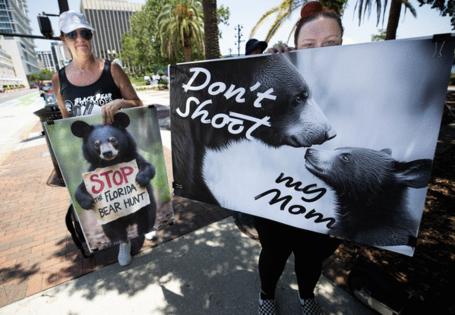State board endorses first Florida bear hunt since 2015
Published in News & Features
OCALA, Fla. — The state wildlife commission on Wednesday endorsed Florida’s first black bear hunt in a decade, turning aside fears of animal advocates who worry the plan for a December hunt will lead to a needless slaughter of the state’s largest land mammal.
The Florida Fish & Wildlife Commission ended four hours of public debate and discussion by voting 4-1 for preliminary rules to guide what would become an annual bear “harvest,” the agency’s term for a hunt. The statewide kill quota is 187, including 18 in Central Florida.
In a hearing room stuffed with more than 400 people, hunt proponents, many wearing blaze orange hunter’s togs,applauded and some pumped their fists. They had praised the hunt options offered by commission staff to its board as “science-based.”
Opponents were disappointed the agency is charging ahead with a hunt. The FWC said 75% of the comments it has received in the runup to the Wednesday meeting oppose a hunt.
“It’s terrible, absolutely cruel and inhumane,” said Kate MacFall, state director of Humane World for Animals, a group formerly known as the Humane Society of the United States. “They’re allowing allow hounding and baiting, the worst option.”
She said she hoped the commission would make “some tweaks” in August to the option when the board finalizes the plan.
The board favored allowing hunters to use dogs to track bears and hunt using a bait station, methods prohibited in the state’s 2015 hunt, which nevertheless led to a much more rapid bear take than predicted, forcing the state to shut it down after two days.
Bear hunters faced off with bear backers in extended public comment during which 170 people took a turn at the microphone.
Foes of the bear hunt traveled from all over the state to Ocala where the wildlife agency’s governing board convened to a standing room crowd at the College of Central Florida. Many sported buttons that opposed the hunt or urged the commission to “WAIT” until FWC had more current population data.
“This isn’t conservation. This is state-sanctioned slaughter,” said Chris Teodorski, arguing against the proposed “harvest,” a term some Fish & Wildlife staff use for the hunt. “It’s bloodsport wrapped in public relations pushed by a Commission that seems to answer more to special interests than to the overwhelming majority of people in Florida who, according to your own data, oppose this.”
Marion County Sheriff Billy Woods spoke in favor of a hunt to blunt a growing bear population that has clashed with a growing human population. In southwest Florida, a 263-pound bear mauled and partially ate an 89-year-old man in Collier County earlier this month, believed to be the state’s first verified fatal bear attack.
Woods said his office has fielded over 100 bear calls over the last nine months, but the problem with bears in reality is much worse.
“I know my residents of Marion County…I love them but they don’t call and report crime. They take care of crimes themselves and they, sure enough, don’t report their interaction with wildlife.”
Some hunters and representatives of outdoors groups pointed out Florida is one of only six states with significant black bear populations that does not allow hunting. Of the states that forbid a hunt, Florida has the most bears.
“Bear is a game species. It’s time for us to have some level of bear hunt,” said Travis Thompson, executive director at the All Florida conservation organization.
FWC biologists said holding a hunt in December would spare more of the species’ females — a critical concern — because they should be in dens by then.
The board-endorsed proposal included pages of details about how the hunt would work. Florida has an estimated more than 4,000 bears, though hunt opponents suggest it could be as high as 6,500. It’s been more than a decade since the state did a comprehensive population survey.
Proposed rules call for a lottery for a permit to kill a bear. Prospective hunters can apply unlimited times — each entry is $5 — but can win just one permit.
Florida residents must pay $100 for a bear permit, out-of-staters $300.
The state is divided into seven bear management areas, three of which can’t be hunted because the bear population in those areas is estimated to be under 200, including one estimated to have fewer than three dozen.
Hunt zones are in the eastern Panhandle, north Florida, southwest Florida and Central Florida, the most heavily populated zone where 1,200 bears are estimated to roam an area which includes Orange, Lake, Marion Osceola, Seminole and Volusia counties.
FWC estimates more than 1,000 bears are also living in both the eastern Panhandle and southwest Florida.
Despite boasting the most bears in the state, Central Florida’s kill quota is low because of weak population growth over the past decade. FWC blames the depressed rate on large number of bears and cubs killed crossing highways.
Under the agency’s plan for an annual, regulated hunt, FWC would set kill quotas each year based on the estimated bear population, management objectives and bear deaths from other causes, including collisions with motor vehicles.
There is little disagreement that civilization and bears don’t get along.
In an interview before the meeting, Matt Scales, 62, a fifth-generation Floridian who killed a bear in the 2015 hunt, said he was in favor of opportunities to hunt one again. “I think there’s plenty of bears,” he said. “But I’ll say this, too: It’s not that bears have moved into our habitat, it’s that we’ve developed into theirs. The greatest threat to the Florida black bear, I truly believe, is not a man with a gun. It’s the guy with a bulldozer.”
-----------
©2025 Orlando Sentinel. Visit at orlandosentinel.com. Distributed by Tribune Content Agency, LLC.







Comments